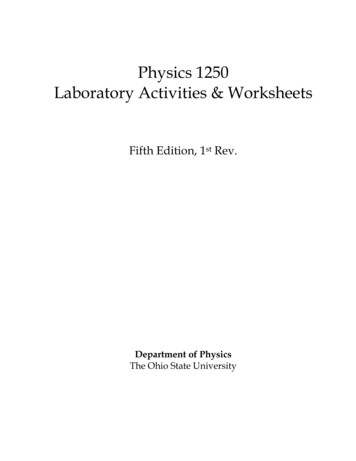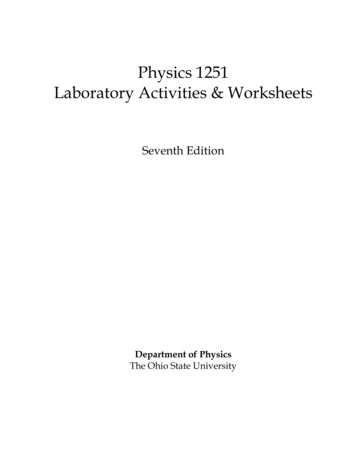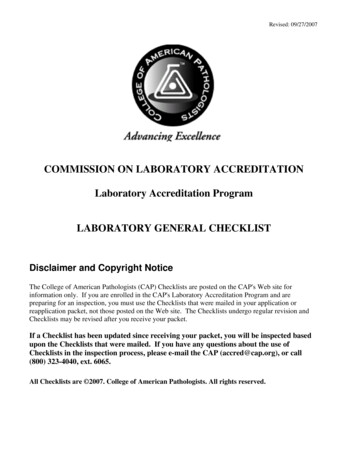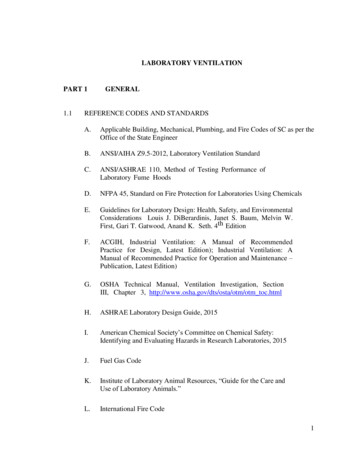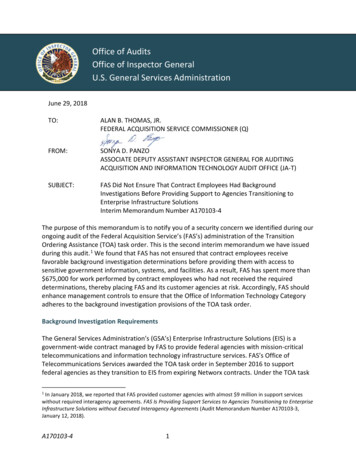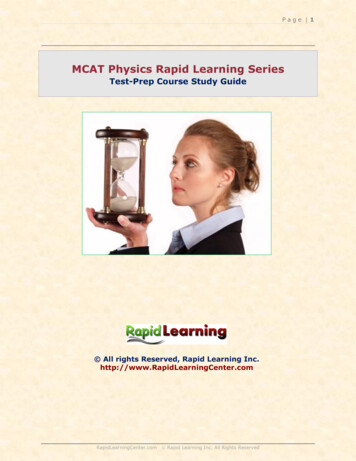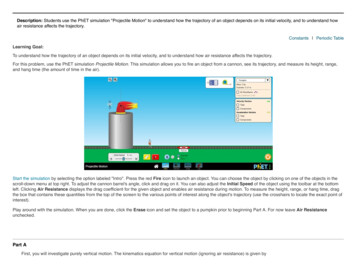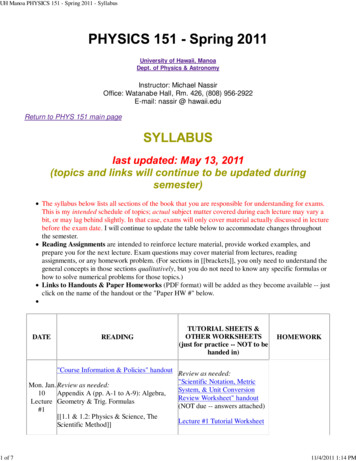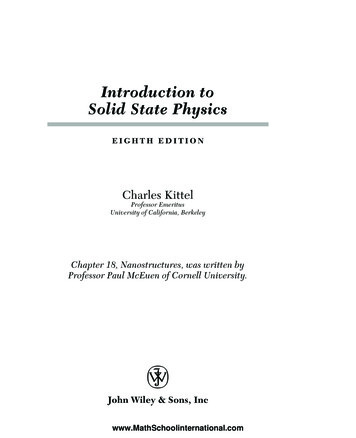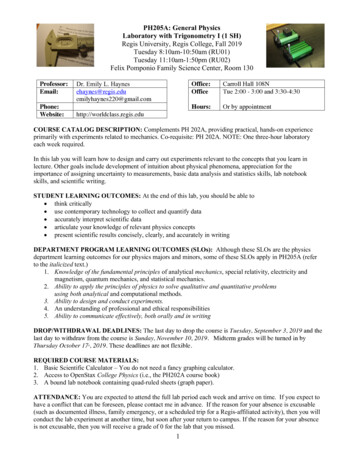
Transcription
PH205A: General PhysicsLaboratory with Trigonometry I (1 SH)Regis University, Regis College, Fall 2019Tuesday 8:10am-10:50am (RU01)Tuesday 11:10am-1:50pm (RU02)Felix Pomponio Family Science Center, Room 130Professor:Email:Phone:Website:Dr. Emily L. ice:OfficeCarroll Hall 108NTue 2:00 - 3:00 and 3:30-4:30Hours:Or by appointmenthttp://worldclass.regis.eduCOURSE CATALOG DESCRIPTION: Complements PH 202A, providing practical, hands-on experienceprimarily with experiments related to mechanics. Co-requisite: PH 202A. NOTE: One three-hour laboratoryeach week required.In this lab you will learn how to design and carry out experiments relevant to the concepts that you learn inlecture. Other goals include development of intuition about physical phenomena, appreciation for theimportance of assigning uncertainty to measurements, basic data analysis and statistics skills, lab notebookskills, and scientific writing.STUDENT LEARNING OUTCOMES: At the end of this lab, you should be able to think critically use contemporary technology to collect and quantify data accurately interpret scientific data articulate your knowledge of relevant physics concepts present scientific results concisely, clearly, and accurately in writingDEPARTMENT PROGRAM LEARNING OUTCOMES (SLOs): Although these SLOs are the physicsdepartment learning outcomes for our physics majors and minors, some of these SLOs apply in PH205A (referto the italicized text.)1. Knowledge of the fundamental principles of analytical mechanics, special relativity, electricity andmagnetism, quantum mechanics, and statistical mechanics.2. Ability to apply the principles of physics to solve qualitative and quantitative problemsusing both analytical and computational methods.3. Ability to design and conduct experiments.4. An understanding of professional and ethical responsibilities5. Ability to communicate effectively, both orally and in writingDROP/WITHDRAWAL DEADLINES: The last day to drop the course is Tuesday, September 3, 2019 and thelast day to withdraw from the course is Sunday, November 10, 2019. Midterm grades will be turned in byThursday October 17 , 2019. These deadlines are not flexible.thREQUIRED COURSE MATERIALS:1. Basic Scientific Calculator – You do not need a fancy graphing calculator.2. Access to OpenStax College Physics (i.e., the PH202A course book)3. A bound lab notebook containing quad-ruled sheets (graph paper).ATTENDANCE: You are expected to attend the full lab period each week and arrive on time. If you expect tohave a conflict that can be foreseen, please contact me in advance. If the reason for your absence is excusable(such as documented illness, family emergency, or a scheduled trip for a Regis-affiliated activity), then you willconduct the lab experiment at another time, but soon after your return to campus. If the reason for your absenceis not excusable, then you will receive a grade of 0 for the lab that you missed.1
LAB HANDOUTS AND PRE-LAB EXERCISES: Lab instructions will be posted on the course website by 4p.m. the Thursday before class. Beginning with lab 2, you will be required to complete a pre-lab report for eachlab period. At beginning of the pre-lab report record your name, the date, lab number and title of the lab. The labreport should summarize the motivation for the experiment to be performed, the key science principle that willbe explored in the lab based on your reading of the lab instructions. For several of the labs a list of preliminaryquestions will be included in the lab instructions. Answers to these questions (in your own words, not google)should be provided in your pre-lab reports. The pre-lab report should be recorded in your lab notebook. Anelectronic scan of your prelab report is due on the WorldClass website by 4 p.m on the Monday before labs.The pre-lab reports are worth 5% of your grade. Late pre-labs will not be credited towards your final grade.Answers to the pre-lab will be discussed at the beginning of each class, students may be selected at random tocontribute to these discussions.IN-CLASS LAB RECORDING AND THE DEVELOPMENT OF LAB REPORTS: Weekly lab reports areto be prepared based on lab notes recorded during the completion of each lab session. The notes for each in-classlab session should be entered into your lab notebook directly below your pre-lab report. Your in-class lab notesshould provide a sequential and complete record of the steps you took to complete the lab including the datarecorded and the conclusions you made based on the processes you tested. It should also include answers tospecific questions outlined in the lab instructions.Your submitted weekly lab report should follow the flow of steps outlined in the lab instructions. Consequently,for each stage of the lab/experiment your notes and written report should record the procedural steps of eachexperiment, the data recorded and the conclusions you made based on the acquired experimental data. Yoursubmitted weekly lab report must include this information adhering to the following guidelines: At the beginning of the report record the date, lab number and title of the lab, your name and the namesof your lab partners. In describing the lab experiments, be sure to provide a description of the equipment that you used—noting the type of data/measurement that was obtained and the obtainable precision of eachmeasurement based on the available equipment. In describing the lab procedure, do not just copy the lab handout and do not attempt to write theprocedural steps all at the end. Instead provide a clear explanation of each event as it occurred duringthe lab. If you take photos of your experimental set-up (a good idea!)— you may also want to paste aprintout the photos into your submitted lab report—however a sketch will do. Record the raw experimental data in your lab notebook in nice handwritten tables. Provide a clear record of the mathematical computations, model fitting, and/or pictorial graphs neededto analyze your experimental data. Present the conclusions you make based on your analysis of the experimental data in completesentences, indicating which analysis tool (modeling fitting, calculations or graphs, etc.) helped you formyour conclusions. i.e, the sentence should have the form, “Based on x, y, and z we conclude a, b, andc.”, or something similar. Once you have completed the entire experiment, provide a short summary of what your learned from theexperiment and what key physics principle determined the outcome of your experiments.SUBMISSION AND GRADING OF THE WEEKLY LAB REPORT AND NOTEBOOK: Your fullycomposed weekly lab reports should be scanned into a pdf and uploaded to the WorldClass dropbox. The reportsmay be submitted at any point during the week in which the lab was completed, but must be submitted forevaluation by 4:30 p.m. on the Friday of each week. In addition, submit a written copy of the lab report to theinstructor at the beginning of the following lab period. Ideally you will be able to complete the entirety of thelab (including your report of the lab work) during the time allotted for the lab course. However, this may notalways be the case. The submission deadline for your reports is designed to provide adequate time for you toreview and thoroughly complete your report as well as scan and upload the completed report to the WordClasswebsite. Your lab reports will be evaluated on demonstration of your understanding of the physical principles explored in the lab. logical consistency of data and conclusions. correctness of answers to any pre-lab questions. presentation of results in lab notebook.2
For many of the labs if you have adequately and sequentially recorded the procedural steps of each stage of theexperiment in your notebook along with the data and analysis questions, a scan of the notes your recorded in classwill sufficiently meet the requirements for the weekly lab report—provided you include in your lab notebook asummary of what you learned from the lab. However, on some occasions, you may find it easier to writeabbreviated notes on the procedures and detailed notes on the data tables and analysis in your lab notebook. Inthese cases, you may present your weekly report as a Word/pdf document. However, bear in mind that weeklylab reports that are submitted as Word/PDF documents MUST record for each stage of the experiment theprocedural steps, the data recorded and the conclusions you made based on the acquired experimental data.Additionally, in these cases both your lab notebook and your weekly report presented as a Word/PDF Documentmust to be uploaded to the WorldClass web and a “hard copy” turned in at the beginning of the following labmeeting.For simplicity, grading of the pre-labs and the in-class lab reports will be limited to “check (10/10)”,“check-plus (8.5/10)”, ”check-minus (7/10)”, “F (3/10)”, and “0”. The standard by which these grades willbe assigned is explained below:CriteriaPointsCheck-plusLab complete, analysis essentially 100% correct, valid conclusions drawn10.0from data, notebook presentation polished.CheckLab complete, only small mistakes in analysis, valid conclusions drawn8.5from data, notebook presentation adequate.Check-minus Modest parts of lab in incomplete or missing, mistakes in data analysis that 7.0lead to substantial distortions, invalid conclusions drawn from data, orinadequate notebook presentation.FSubstantial parts of lab incomplete or missing3.00Absent from lab, or notebook not submitted.0.0Unless arrangements are made in advance, notebooks received after the Friday deadline may be subject to apenalty of 2 pts. I will apply this penalty only if I have already started grading the notebooks for your lab sectionat the time that I receive yours, so that I have to process it out of sequence.FINAL PROJECT REPORT: You will be asked to write up an extended report on a lab (TBD). On theFriday of week 14 (Nov. 29, 2019) both your weekly lab report and an outline of your final report willbe due. In week 15, the last week of class prior to finals, I will meet with each student to discuss youroutline and draft for your final report. Your grade for this lab period will be a function of the materialsyou present during those meetings. A detailed description of the expected format for the report will bedistributed later in the semester. Hardcopies and electronic copies must be submitted for grading.DUE DATE: The final due date for the lab report (hardcopy and electronic copy) is Tuesday, December 10,2019. I will not accept any work submitted after 5pm on this date.COMPUTATION OF FINAL GRADES: The work in this course will be weighted as follows Weekly lab report: 75% Weekly Pre-labs: 10% Final Project: 15%You can expect the equivalent numerical grade to correspond to the following letter grade, but I reserve the rightto assign a higher grade than would be given by this table (if, for example, an lab turns out to be more difficultthan I have anticipated), but I will not deviate lower.93-10090-9288-8983-8780-8278-79AAB BBC Outstanding scholarship73-7770-7267-6963-6660-6259 or lowerSuperior work / Satisfactory3CC D DDFSatisfactory / UnsatisfactoryUnsatisfactoryFailure (no credit)
INCOMPLETE GRADES: If unforeseen circumstances occur, and a student is unable to complete the requiredwork for the course, an “Incomplete” grade may be submitted. A request must be made in writing and approved bythe instructor. The request will include a timeline and plan for completing the work. Please see the UniversityCatalog for more of the full policy: “A grade of an Incomplete or ‘I’ denotes that the required work for the course isincomplete due to unforeseen circumstances” [emphasis added], which means “an accident, an illness, a death ormajor life transaction has occurred.”COLLABORATION AND ACADEMIC INTEGRITY: You are expected to work within your assigned labgroup, to collect your data and to discuss your analysis and conclusions with the other group members.However, it is not acceptable to simply copy another person’s notebook or lab report, or to plagiarize from anyother source.QUESTIONS & PROBLEMS:If you have questions about any aspect of the class, or if you start running into difficulties following the materialor keeping up with assignments, please don’t hesitate to get in touch with me. Remember, I’m here to help youlearn physics! I can be reached by email, and I will get back to you promptly. Also, I enjoy any conversationabout physics, astronomy, or science.TENTATIVE COURSE CALENDAR: The following tentative schedule of lab experiments remains subject tochange as the semester progresses. Regular updates on the reading assignments, homework sets and due dates,are posted on the course website 3141516Main Topic(s) *Introduction, error analysis, and graphingMotion detector graph matchingVector tutorialForce tableNewton’s lawsStatic and Kinetic FrictionDetermine "g" on an incline planeFall Break – no class on TuesdayMomentum and CollisionsConservation of EnergyCircular Motion and FrictionMoment of Inertia and Rotational EnergySimple Harmonic MotionSimple pendulum and Final Project Proposal Planning(Thanksgiving week and we do have lab!)Pendulum and the Small Angle ApproximationFinal Project interviews (individual appointments)Final lab report due on Tuesday Dec. 10, 2019 by 5pm. Hardcopy tothe instructor and electronic copy on WorldClass Dropbox.*The instructor reserves the right to modify the course schedule.4
ADDITIONAL COURSE AND UNIVERSITY INFORMATIONLABORATORY BEHAVIOR: Students and faculty have a responsibility for maintaining an appropriatelearning environment. Our laboratory is a “distraction-free zone”. Cell phone usage (e.g., texting, webbrowsing, etc.) is only permitted when used to collect data, or other activities related to your experimentation.Students are expected to remain in the laboratory for the entire period. Water bottles are permitted, but not otherfood and drink.ACADEMIC HONOR CODE: All members of the Regis University community exhibit the qualities ofhonesty, loyalty and trustworthiness in all academic activities, holding themselves and each other accountablefor the integrity of the learning community. Regis University students are committed to the highest standards ofacademic integrity and assume full and complete responsibility for maintaining those standards in the academicenvironment.ACADEMIC INTEGRITY VIOLATIONS: Violations of academic integrity are taken very seriously andinclude cheating, plagiarism, fabrication, collusion and other forms of academic misconduct. All violations willbe reported with appropriate sanctions applied. Sanctions can include, but are not limited to failure of anassignment, failure of a course, removal of academic honors, or review of the Academic Integrity Tutorial. Formore serious violations, program suspension, College dismissal or University expulsion may be imposed. Referto the Regis College Office of the Academic Dean for further information. This Academic Honor Code appliesto any student enrolled in a course at Regis University or one of its university partners, regardless of thestudent’s home college or program, and will be enforced according to the policies and procedures outlined in theUniversity Academic Integrity Policy.It is the responsibility of each student to review all aspects of the course syllabus and agree to adhere to theAcademic Honor Code. In doing so, the student acknowledges that the work represented in all examinationsand other assignments is his or her own and that he or she has neither given nor received unauthorizedinformation. Furthermore, the student agrees not to divulge the contents of any examination or assignment toanother student in this or ensuing semesters.THE LEARNING COMMONS: The Learning Commons’ Writing Center, Tutoring, and Academic SuccessWorkshops help with writing and studying in one-on-one and group sessions, in person and online. Writing Center: all stages of writing, all degrees and disciplines.Tutoring: available in a range of subjects at introductory and intermediate levels.Smarthinking: another free online tutoring option. Writing, business, nursing, computer programming,mathematics, sciences, and Spanish support by highly trained tutors! 10 free hours annually.Academic Success Workshops: led by Regis faculty and staff, free for Regis members, and cover a range oftopics.Visit http://regis.edu/tlc to schedule writing/tutoring appointments, log into Smarthinking, reserve studyspace in TLC, view workshop schedule, access online resources, and learn more about TLC.Contact tlc@regis.edu/303-964-6591/Clarke Hall 241.LEARNING SUPPORT: If you have a documented disability requiring academic adjustments, please contactDr. Joie Williams, Director of Disability Services (303-964-3666, mbwillia@regis.edu, Clark Hall 225). Shewill review your documentation with you and help determine appropriate, reasonableaccommodations. Following the meeting with Dr. Williams, please make an appointment with your instructor todiscuss your accommodation request in light of the course requirements. You may self-disclose and requestacademic adjustments at any time during the semester. However, it is strongly recommended that you do so assoon as possible because accommodations are not provided retroactively and adequate lead-time is required.5
COUNSELING: During the semester, if you find that life stressors are interfering with your academic orpersonal success, consider contacting the Office of Counseling and Personal Development (OCPD). All fulltime Regis College students are eligible for counseling services at no charge. OCPD is located in the Coors LifeDirection Center, Room 114 and can be contacted by phone 24/7 at 303-458-3507. For more information, seewww.regis.edu/ocpd.DIVERSITY AND INCLUSION: At Regis University the term “diversity” affirms our Jesuit commitment tobuild a community of excellence that values inclusion, dignity and the contributions of all our members.We strive to: Shape a learning environment characterized by the Jesuit traditions of mutual respect and the pursuit ofsocial justice. Contribute to the richness and vitality of our global Regis community by recognizing our variousidentities and experiences including, but not limited to, age, gender, race/ethnicity, class, disability,sexual orientation, religion and other forms of human difference. Fulfill our Jesuit Catholic mission through each member of our community by maintaining a humaneatmosphere where the human rights of every individual are recognized and respected through words andactions.Should an individual ever feel as though these values are not being upheld in the academic or residentialenvironment, we encourage that person to contact the Office of Diversity, Equity and Inclusive Excellence,Student Center, Suite 219; diverse@regis.edu, 303-964-6211.TITLE IX AND REGIS’S NONDISCRIMINATION AND SEXUAL MISCONDUCT POLICY: In theevent that you choose to write or speak about having survived sexualized violence, including rape, sexualassault, dating violence, domestic violence, or stalking and specify that this violence occurred while you were aRegis student, federal and state education laws require that, instructors notify the Regis University Title IXCoordinator, Michelle Spradling. She will contact you to let you know about accommodations and supportservices at Regis and requirements for holding accountable the person who harmed you. To learn more aboutTitle IX, explicitly at Regis, go to pxIf you do not want the Title IX Coordinator notified, instead of disclosing this information to your instructor,you can speak confidentially with counselors in the Office of Counseling and Personal Development (seebelow) and the Blue Bench, a community
Regis University, Regis College, Fall 2019 Tuesday 8:10am-10:50am (RU01) Tuesday 11:10am-1:50pm (RU02) Felix Pomponio Family Science Center, Room 130 Professor: Dr. Emily L. Haynes Office: Carroll Hall 108N Email: ehaynes@regis.edu emilyhaynes220@gmail.com Office Tue

